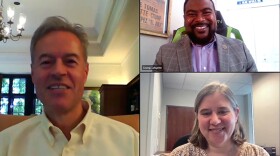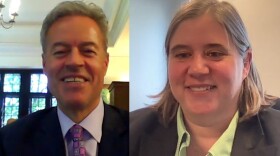
UW-Milwaukee
Host of Curious Campus and UWM Chancellor’s ReportThe University of Wisconsin-Milwaukee produces the following shows:
- Curious Campus, a show about science, discovery and culture. Hosts: Tom Luljak, Howie Magner.
- UWM Chancellor’s Report, a show covering issues in higher education and what’s happening at the university. Features UWM Chancellor Mark A. Mone. Host: Ele Ellis. UW-Milwaukee has a unique mission as both a top-tier research university and an access institution, striving to ensure that students have equitable opportunities to earn a college degree. Learn more at uwm.edu.
-
One of UW-Milwaukee’s strengths is its partnerships. They are multi-faceted and can focus on a number of areas, including economic development and issues of equity. Today, we will talk about the value and importance of public-partnerships with UWM Chancellor Mark Mone and guest Lafayette Crump, the City of Milwaukee’s Commissioner of City Development.
-
One of UW-Milwaukee’s strengths is its partnerships. They are multi-faceted and can focus on a number of areas, including economic development and issues of equity. Today, we will talk about the value and importance of public-partnerships with UWM Chancellor Mark Mone and guest Lafayette Crump, the City of Milwaukee’s Commissioner of City Development.
-
UW-Milwaukee is ramping up for the year ahead as many families begin pivoting from summer to back to school. But summer is anything but quiet on campus as thousands of new students and their families experience orientations, planning for fall in what will be year three of the pandemic, and advocating for support during turbulent times.
-
UW-Milwaukee is ramping up for the year ahead as many families begin pivoting from summer to back to school. But summer is anything but quiet on campus as thousands of new students and their families experience orientations, planning for fall in what will be year three of the pandemic, and advocating for support during turbulent times.
-
The world of collegiate sports has gone through some significant changes this year and UW-Milwaukee is no exception. Joining UWM General Manager John Hess and UWM Chancellor Mark Mone are guests Kyle Rechlicz, UWM’s Women’s Basketball Coach; and Bart Lundy, UW-Milwaukee’s new Men’s Basketball Coach.
-
The most effective way to study the Great Lakes is to go beneath the surface. UWM researchers currently use a converted vintage Army T-boat to work on Lake Michigan. We also peek into the future of research on the Great Lakes.
-
Nanomaterials are tiny particles made of various chemicals that are incorporated into products like cosmetics, medicine and food. They’re also constantly shed into the environment. How do nanomaterials affect organisms that live in Lake Michigan?
-
Cost may prevent many people who need a hearing aid from getting one. Those with hearing aids get relief, but it may not be a cure-all. A UWM engineer and an audiologist discuss two novel technologies that can help people hear better.
-
The performing arts have a profound effect on our lives. From music, to dance, to theatre and the big screen — the performing arts transport us. A recent visit to UW-Milwaukee by alumnus and actor Willem Dafoe drove this home when he received an honorary Doctor of Arts, delivered the spring commencement address and answered questions during a remarkable "Into the Alumni Studio" event. In this special edition of the Chancellor's Report program, we share excerpts of UW-Milwaukee Chancellor Mark Mone's interview with Willem Dafoe.
-
In the wild, frog romance is a raucous affair. When it’s time to mate, the female eastern gray tree frog makes her way to the pond, when there could be hundreds of potential suitors each calling to her in loud chirps that have different audible characteristics.In this nocturnal chorus, the male aims to charm the female with his particular call. But what makes a call “attractive?” On this episode of Curious Campus, we talk with two researchers who specialize in amphibian communication — how frogs message each other and then decide how to respond.Gerlinde Höbel is an associate professor in biological sciences at UW-Milwaukee. Michael Reichert is an assistant professor of integrative biology at Oklahoma State University.








